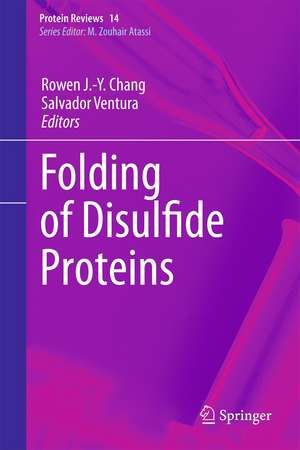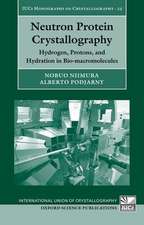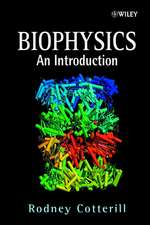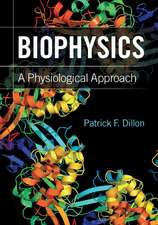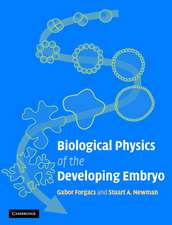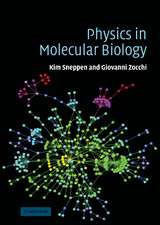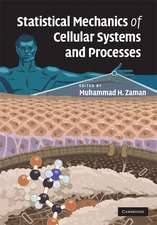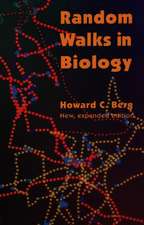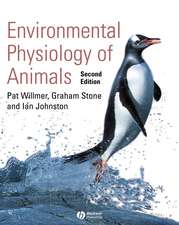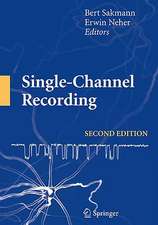Folding of Disulfide Proteins: Protein Reviews, cartea 14
Editat de Rowen J. Y. Chang, Salvador Venturaen Limba Engleză Paperback – 24 oct 2013
Will also be of interest to everybody interested in problems related to protein folding, and anyone who is interested in understanding the mechanism of protein misfolding and protein misfolding-related diseases.
| Toate formatele și edițiile | Preț | Express |
|---|---|---|
| Paperback (1) | 696.82 lei 6-8 săpt. | |
| Springer – 24 oct 2013 | 696.82 lei 6-8 săpt. | |
| Hardback (1) | 948.92 lei 6-8 săpt. | |
| Springer – 12 aug 2011 | 948.92 lei 6-8 săpt. |
Din seria Protein Reviews
- 18%
 Preț: 945.92 lei
Preț: 945.92 lei - 15%
 Preț: 641.85 lei
Preț: 641.85 lei - 18%
 Preț: 950.03 lei
Preț: 950.03 lei - 18%
 Preț: 944.67 lei
Preț: 944.67 lei - 18%
 Preț: 727.48 lei
Preț: 727.48 lei - 18%
 Preț: 1226.60 lei
Preț: 1226.60 lei - 18%
 Preț: 1278.02 lei
Preț: 1278.02 lei - 5%
 Preț: 1422.87 lei
Preț: 1422.87 lei - 5%
 Preț: 1098.48 lei
Preț: 1098.48 lei - 5%
 Preț: 1418.68 lei
Preț: 1418.68 lei - 5%
 Preț: 1436.41 lei
Preț: 1436.41 lei - 23%
 Preț: 1211.53 lei
Preț: 1211.53 lei - 18%
 Preț: 1230.21 lei
Preț: 1230.21 lei - 24%
 Preț: 1051.51 lei
Preț: 1051.51 lei - 24%
 Preț: 802.76 lei
Preț: 802.76 lei
Preț: 696.82 lei
Preț vechi: 819.79 lei
-15% Nou
Puncte Express: 1045
Preț estimativ în valută:
133.35€ • 138.71$ • 110.09£
133.35€ • 138.71$ • 110.09£
Carte tipărită la comandă
Livrare economică 14-28 aprilie
Preluare comenzi: 021 569.72.76
Specificații
ISBN-13: 9781461429975
ISBN-10: 1461429978
Pagini: 296
Ilustrații: X, 286 p.
Dimensiuni: 155 x 235 x 16 mm
Greutate: 0.42 kg
Ediția:2011
Editura: Springer
Colecția Springer
Seria Protein Reviews
Locul publicării:New York, NY, United States
ISBN-10: 1461429978
Pagini: 296
Ilustrații: X, 286 p.
Dimensiuni: 155 x 235 x 16 mm
Greutate: 0.42 kg
Ediția:2011
Editura: Springer
Colecția Springer
Seria Protein Reviews
Locul publicării:New York, NY, United States
Public țintă
Professional/practitionerCuprins
Oxidative folding: coupling conformational folding and disulfide formation.- The case of oxidative folding of ribonuclease A: Factors impacting fold maturation of ER-processed proteins.- Cystine knot folding in cyclotides.- In vitro folding of single chain/double chain insulin and related protein.- Unfolding and refolding of disulfide proteins via disulfide scrambling.- Small catalysts for Protein oxidative folding.- Protein Disulfide Isomerase and the Catalysis of Oxidative Protein Folding.- Allosteric disulfide bonds.- The problem of expression of multi-disulfide bonded recombinant protein in E. coli.- NMR-spectroscopic investigation of disulfide dynamics in unfolded states of proteins.- A half-century of oxidative folding and protein disulfide formation.
Textul de pe ultima copertă
Disulfide-containing proteins belong to a unique class of proteins for studying the mechanism of protein folding. Their folding mechanism can be analyzed by three distinct techniques: (1) The conventional denaturation-renaturation method (disulfide intact); (2) The disulfide oxidation method (oxidative folding); and (3) The emerging disulfide scrambling method. Each technique provides specific information as to how an unfolded disulfide protein refolds to form the native structure. This book is intended to highlight the knowledge of several important proteins (BPTI, RNase A, beta-Lactalbumin and Lysozyme etc.) that have been characterized in depth by these methodologies. The book will also devote sections to comparing these methodologies and chaperones (PDI and Dsb machineries) that facilitate folding of disulfide proteins.
Folding of Disulfide Proteins aims to cover the knowledge of protein folding accumulated from studies of disulfide-containing proteins, including methodologies, folding pathways, and folding mechanism of numerous extensively characterized disulfide proteins. This book will be of interest to those interested in problems related to protein folding, and anyone who is interested in understanding the mechanism of protein misfolding and protein misfolding-related diseases.
Folding of Disulfide Proteins aims to cover the knowledge of protein folding accumulated from studies of disulfide-containing proteins, including methodologies, folding pathways, and folding mechanism of numerous extensively characterized disulfide proteins. This book will be of interest to those interested in problems related to protein folding, and anyone who is interested in understanding the mechanism of protein misfolding and protein misfolding-related diseases.
Folding of Disulfide Proteins aims to cover the knowledge of protein folding accumulated from studies of disulfide-containing proteins, including methodologies, folding pathways, and folding mechanism of numerous extensively characterized disulfide proteins. This book will be of interest to those interested in problems related to protein folding, and anyone who is interested in understanding the mechanism of protein misfolding and protein misfolding-related diseases.
Folding of Disulfide Proteins aims to cover the knowledge of protein folding accumulated from studies of disulfide-containing proteins, including methodologies, folding pathways, and folding mechanism of numerous extensively characterized disulfide proteins. This book will be of interest to those interested in problems related to protein folding, and anyone who is interested in understanding the mechanism of protein misfolding and protein misfolding-related diseases.
Caracteristici
Covers the knowledge of protein folding accumulated from studies of disulfide-containing proteins, including methodologies, folding pathways, and folding mechanism of numerous extensively characterized disulfide proteins Valuable supplementary reading for general biochemistry, biophysics, molecular biology, and cellular biology courses for graduate and undergraduate students Can be used for specialized graduate-level biochemistry, biophysics, and molecular biology courses dedicated to protein folding as well as related biological problems and diseases
